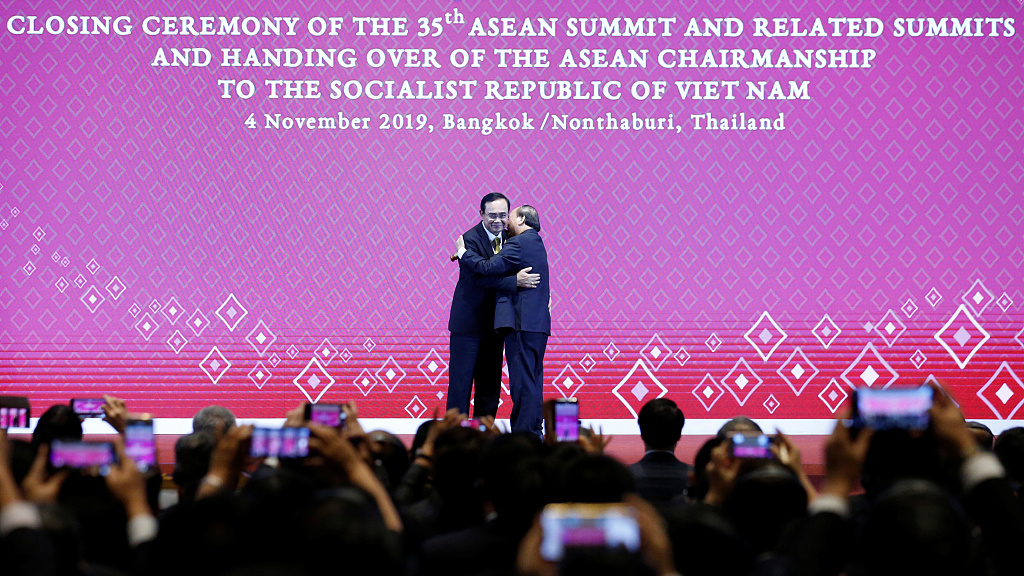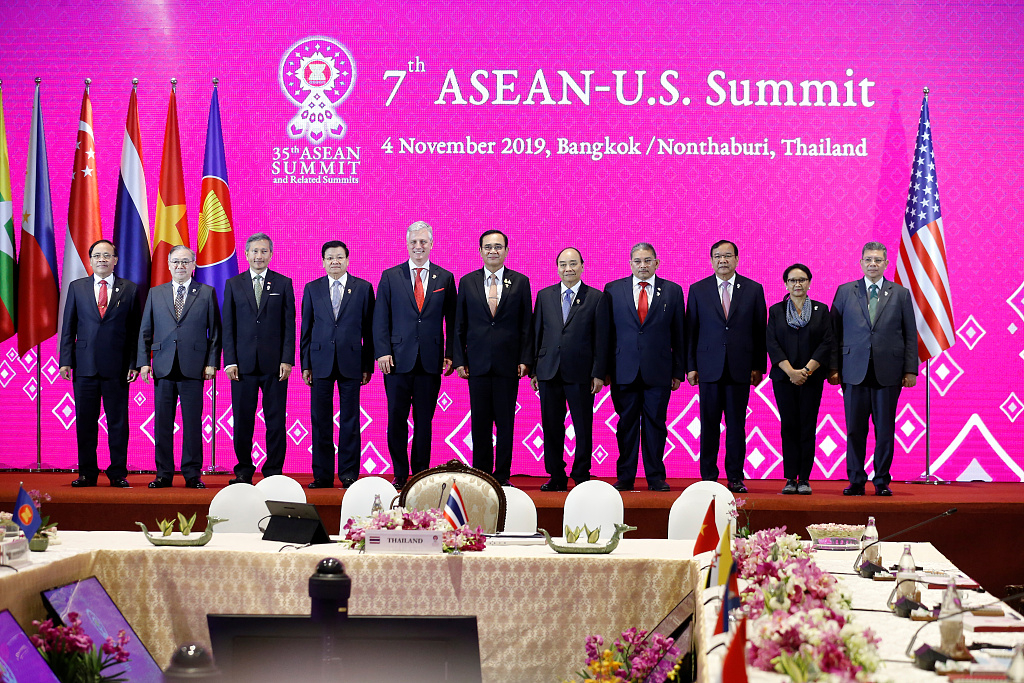
Thai Prime Minister Prayuth Chan-Ocha hugs Vietnam's Prime Minister Nguyen Xuan Phuc during the closing ceremony of the 35th ASEAN Summit and related summits in Bangkok, Thailand, on November 4, 2019. /VCG Photo
Thai Prime Minister Prayuth Chan-Ocha hugs Vietnam's Prime Minister Nguyen Xuan Phuc during the closing ceremony of the 35th ASEAN Summit and related summits in Bangkok, Thailand, on November 4, 2019. /VCG Photo
Editor's note: Dr. Ji Xianbai is a research fellow with the International Political Economy Program of S. Rajaratnam School of International Studies, Nanyang Technological University, Singapore. The article reflects the author's opinions, and not necessarily the views of CGTN.
Between October 31 and November 4, the convening power of the Association of Southeast Asian Nations (ASEAN) was on full display. A slew of ASEAN-centered diplomatic events including ASEAN Summit, East Asia Summit, ASEAN-United Nations Summit, ASEAN+3 (China, Japan and South Korea) Summit, ASEAN-China Summit, ASEAN-India Summit and Mekong-Japan Summit were held in Bangkok.
At the summits, in keeping with the ASEAN chair, Thailand's theme of "Advancing Partnership for Sustainability," leaders adopted various declarations pertaining to a range of pressing issues including climate change, children protection, education, active aging and social work and vaccinations, among others. In addition, ASEAN signed agreements with China and the World Bank on connectivity and infrastructure investment. ASEAN even inked a memorandum of understanding with FIFA with an eye on co-hosting the 2034 World Cup.
Despite all these achievements, the summits in Thailand saw some challenges.
First of all, the United States sent a downgraded delegation to the ASEAN engagement. Some ASEAN states had expected President Donald Trump to come to endorse the ASEAN Indo-Pacific Outlook document and reassure Southeast Asian economies caught in the crossfire of Sino-American trade confrontations. Much to their disappointment, Trump did not show up, neither was he bothered to dispatch the "Two Mikes" (Pence or Pompeo) to attend the summits.
While some pointed to the impeachment inquiry against Trump and the American recent trade spats with Thailand as excuses, these face-saving theories were all proposed to cover up an inconvenient truth: Trump does not care about Southeast Asia and disapproves of multilateralism as ASEAN's fundamental modus operandi. An ardent unilateralist and chauvinist, the erratic U.S. president had every reason to give ASEAN-related summits a ridiculing cold shoulder. In protest, a majority of ASEAN leaders skipped the ASEAN-U.S. meeting.

The ASEAN-U.S. Summit receives a down-sized treatment on November 4, 2019, given U.S. President Donald Trump's attitude towards the organization. /VCG Photo
The ASEAN-U.S. Summit receives a down-sized treatment on November 4, 2019, given U.S. President Donald Trump's attitude towards the organization. /VCG Photo
Second, hopes to conclude the lengthy talks on the Regional Comprehensive Economic Partnership (RCEP) were regrettably dashed. RCEP is a mega-scale free trade agreement involving 10 ASEAN member states plus China, Japan, South Korea, India, Australia and New Zealand. This 16-party RCEP, if agreed, would create the world''s largest free trade area. Initially got underway in 2013, RCEP negotiations did not hit the finish line in Bangkok after six years of repeated delays.
The sole holdout to RCEP is India. India had agreed to a substantial degree of external liberalization; but when local oppositions surged, New Delhi backtracked on some verbal promises during negotiations. At the last minute, India made new demands in relation to the right to self-initiate bloc-wide safeguard mechanisms, control cross-border flow of data, adopt country-specific rule of origin, and cut tariffs from the 2019 level instead of 2013. These tough, somewhat protectionist requests were met with resistance from the other 15 RCEP partners. For tense negotiations on the eve of ASEAN summits proved unable to iron out differences, India opted out of the agreement for now.
Regrettably, Thailand failed to achieve what could not be done under Singapore on RCEP. Now the prevailing assumption is that RCEP, most possibly without India, could be finalized earliest in February, 2020 under Vietnam's ASEAN stewardship. The bucks should and must stop in Hanoi in the interest of not only RCEP participants but also the wider global community under the threat of protectionism. The world desperately needs a torchbearer like the RCEP championing free trade and cooperative international economic order.
These two "disappointments" had cast a shadow over otherwise jubilant ASEAN gatherings. At worst, they may unintentionally leave an impression that ASEAN is in decline in geostrategic terms and indecisive on economic matters. Going forward, it is therefore imperative for ASEAN to strengthen "ASEAN Centrality" and get RCEP done as soon as possible so as to retain and boost its collective geopolitical relevance.
(If you want to contribute and have specific expertise, please contact us at opinions@cgtn.com.)